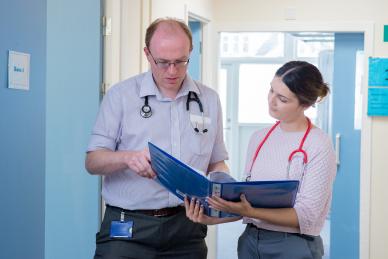Events
We host events on Geriatric Medicine and other related fields throughout the year. Visit our events programme to find out more.
Empowering medical excellence, shaping healthcare futures.
Varied and interesting work
Usually involves working in a team with different disciplines
Rehabilitating patients to their potential is rewarding
There is a lot of general medicine involved
We see interesting patients with interacting co-morbidities and often complex social situations. We need to assess patients holistically in conjunction with a multi-disciplinary team (MDT)
Can sub-specialise if you wish (stroke, movement disorders, falls etc)
Lack of ‘craft’ (e.g. endoscopy) occasionally makes it hard to protect training time
Dr Jenny Lonnen - ST5.
"The work is very varied and patient conditions are often complex."
Teamwork is fundamental in geriatric medicine, and it could be argued that patients are assessed more holistically than in ‘single organ’ specialties. The work is very varied and patient conditions are often complex, which leads to continuing challenges and keeps the work interesting.
Speak to Consultants in this specialty to express your interest
Get involved in audits and projects in your local department
Join the British Geriatrics Society and go to conferences
Try to get involved in the work of the department out of the ward environment (e.g. day hospital, clinics etc)
Days are varied. They often, but not invariably, begin with a ward round. Then activities are a mixture of outpatient clinics, medical day hospital, long-term care wards, liaison work (e.g. orthogeriatrics, surgical), multi-disciplinary team (MDT) meetings and meeting with patient relatives. From the GIM/acute point of view, you also take part in the acute medical-take rota, and do post-take ward rounds with Consultant supervision.

Geriatric medicine is one of the largest specialties in the UK. It offers a stimulating intellectual challenge: illness may present in unusual ways in older people, they frequently have multiple pathologies that interact, and they are particularly prone to adverse drug reactions. It allows you to maintain a generalist approach while also developing a sub-specialty interest. This can range from stroke to Parkinson's disease, falls and fracture prevention, diabetes or cardiovascular disease, to name but a few. It also offers the chance to work both in community and hospital settings. Research is at last generating an ever-expanding evidence base for the management of many conditions in old age and the National Service Framework for Older People has laid out some challenging targets for healthcare provision.
There are presently around 800 Consultants in the specialty but numbers are expanding, so career prospects are excellent. The most effective geriatrician is an excellent general physician with good communication skills, who is able to work well in a team with other disciplines and can empathise with older people. Most people are attracted by the holistic way that the specialty takes on acute investigation and management together with subsequent rehabilitation and discharge planning, all tailored to each individual's needs.
A four-year full-time training programme (dual certification in Geriatric Medicine and Internal Medicine) following successful completion of a foundation programme and a core training programme (Internal Medicine Training Stage 1 or Acute Care Common Stem - Internal Medicine)
Training will vary depending on region but usually would consist of one year equivalent of Internal Medicine training and 3 years equivalent of Geriatric Medicine training.
Trainees should expect exposure to inpatient care, community settings and outpatients. They should expect to develop skills in the management of patients presenting with frailty, falls, dementia, delirium, stroke, functional decline, polypharmacy and multiple co-morbidities. They should be able to address the challenges of frailty, rehabilitation and requirements for social care, complex comorbidity, uncertainty, and end of life care.
Trainees must complete one additional theme for service from a choice of five: orthogeriatrics, incontinence, community, movement disorder or stroke.
Specialty Certificate Examination in Geriatric Medicine.
Trainees are expected to be competent in research methodology, clinical education, leadership and management and quality improvement. They are expected to complete formal courses in each of these areas within their training.
Subspeciality areas require specific attachments for curricular requirements to be met:
Research is not essential, but there are a wide variety of opportunities for this (usually by taking a higher degree i.e. MD or PhD).
There are opportunities for undertaking out of programme experiences in areas such as clinical education, leadership or quality improvement.
Trainees who wish to complete the full stroke sub-specialty programme will require to undertake an additional 6 months of dedicated stroke training.
Listen to our Career Conversations podcast for our episode on Geriatric Medicine linked below.

We host events on Geriatric Medicine and other related fields throughout the year. Visit our events programme to find out more.